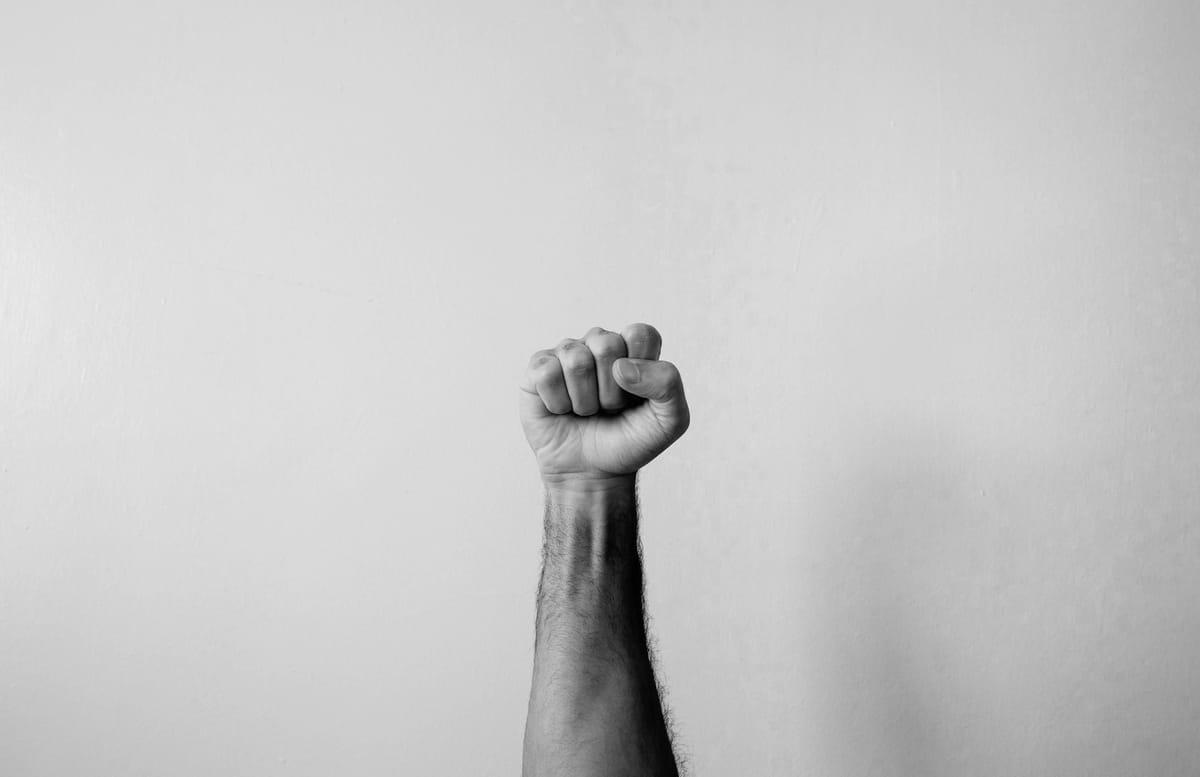Fighting to Exist on a Zero-Hour Contract with Death
Fighting to live — truly fighting — is a full-time job. And like most full-time jobs in this economy, it comes with zero benefits, gaslighting management, and no chance of promotion.

Some mornings, I like to imagine a performance review.
A suited manager — maybe an AI-generated minister with a perfectly rehearsed human smirk — sits me down with a clipboard and says:
"Now Lloyd, we’ve noticed your productivity has dipped since your spine fused, your vision blurred, and you started screaming into a pillow every morning. Any reason for that?”
I’d laugh, if it didn’t cost me half my daily energy ration and trigger a nosebleed.
But really, what are disabled people if not the UK’s most reluctant unpaid interns in the war against extinction?
We wake up each day and fight — not for luxury, not for advancement, but for basic existence. We fight for the right to sit in a chair that doesn’t hurt. To keep a flat warm enough to stop the muscles from freezing. To access a toilet before it becomes a public scandal. And to do all of this while being labelled "unsustainable" by people with second homes, catered lunches, and Oxbridge leg-ups.
This isn’t a metaphor.
Fighting to live — truly fighting — is a full-time job. And like most full-time jobs in this economy, it comes with zero benefits, gaslighting management, and no chance of promotion.
Let’s talk about performance-related pay.
If politicians were on it, most of them wouldn’t be able to afford the luxury of blaming disabled people for their own policies. And yet, somehow, the very group with the lowest actual fraud rates — us — is accused, again and again, of draining the system.
We, the drained.
Disabled people are the original gig economy workers. Except the gig is: "Please don’t reduce my oxygen supply this month." The job description? “Survive in a country actively designing systems to make that statistically unlikely.”
Imagine applying for that on Indeed.
Salary: Negative £62 a week, clawed back if you dare to eat.
Perks: You get to hear strangers debate your existence on live radio.
Uniform: The same trousers for three weeks because laundry is a luxury task.
Bonuses: An online form that erases your medical records if you press ‘back.’
Performance-related pay?
We’d be rich.
We’ve performed through pain, smiled through seizures, attended assessments while bleeding, fainting, convulsing, or dissociating — and still got told, “You made eye contact, so you're clearly fit for work.” Yeah. But I was shitting myself when that happened. I mean. Really shitting myself".
We’ve become actors, contortionists, magicians. We disappear from the system, reappear in headlines, and vanish again when the news cycle moves on.
Meanwhile, the journalists fluffing their moral cushions and filing ‘balanced’ takes about “benefit dependency” still haven’t done the basic homework. How many PIP appeals succeed? (Most.) How many people die waiting for decisions? (Too many.) How many ministers face consequences for false statements about us? (None.)
You couldn’t get away with that on a call centre floor.
If journalists were held to performance targets based on truth rather than trending topics, we’d have fewer breakfast segments about “scroungers” and more emergency briefings on why the UK is gutting its own social contract.
Instead, we get opinion pieces that sound like they were dictated by an algorithm trained on 1990s tabloid headlines and Piers Morgan’s aftershave.
Let’s be real: this government isn’t just slashing benefits. It’s weaponising shame.
It’s no longer enough to be disabled. You must now perform your suffering in a way that reassures the healthy that they are still morally superior.
Cry, but not too loudly. Limp, but not if you can also write. Be articulate, but not confident. Be grateful, but never angry. Be visible, but not in public. Exist, but preferably on mute.
We’re expected to narrate our pain in just the right tone: sad enough to elicit pity, but not disruptive enough to suggest we deserve power.
That’s the trade. And if you refuse it? You’re “militant.” You’re “too political.” You’re suddenly not the right kind of disabled anymore.
But here’s the punchline.
We are political — by necessity. Every breath is a protest. Every letter, every social media post, every blog typed with aching hands is a refusal. We refuse to die quietly for their spreadsheets.
I refuse to die quietly.
And yes, we get tired.
Not just physically — though there’s that too, the bone-deep weariness that comes from being both unwell and untrusted. But tired of having to be the experts, the advocates, the campaigners, the whistle-blowers. We run these campaigns from hospital beds. From cold kitchens. From pain-induced delirium. Not because we’re strong — but because we were left no other choice.
There is no applause. No medals. No wellness influencer quoting us in curated pastels. Just a growing pile of unread tribunal letters and the lingering taste of another unfinished complaint.
But here’s something funny — not “ha ha,” but tragicomedy worthy of Beckett: for all the rhetoric about “dependence” and “burden,” the state has become more reliant on us than we are on it.
Without our unpaid labour — our admin, our strategy, our legal knowledge, our lived experience poured freely into the mouths of broken systems — the whole thing would collapse. And maybe that’s why they fear us. Because we keep surviving what they designed to break us.
So next time a politician wants to talk about “value for money,” ask them if they’d last a week on our contract.
Ask them how they’d perform with no sleep, no heat, no certainty, and an inbox full of rejections.
Ask them what their productivity would look like with spasms down one side and three hours of phone queueing to prove they’re not lying about it.
Then tell them our only KPI is this:
We’re still here.
And if that doesn’t count as performance, then maybe they should be the ones reassessed.
